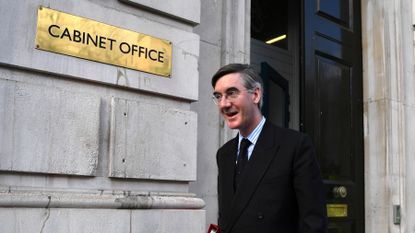Jacob Rees-Mogg loses vote on debating Westminster bullying claims
Critics said proposal would undermine new independent panel and ‘re-victimise’ victims

MPs last night voted down a proposal introduced by Leader of the Commons Jacob Rees-Mogg to allow the House to debate complaints of bullying and harassment brought against them.
An amendment tabled by Labour MP Chris Bryant ruling out debates on sanctions made by a new independent panel set up to deal with such allegations passed by 243 to 238 - “to the delight of parliamentary staffers and campaigners”, says The Guardian.
In an open letter seen by the newspaper, past and present parliamentary staff, union leaders, MPs and women’s groups had accused Rees-Mogg of undermining the new independent system.
Subscribe to The Week
Escape your echo chamber. Get the facts behind the news, plus analysis from multiple perspectives.

Sign up for The Week's Free Newsletters
From our morning news briefing to a weekly Good News Newsletter, get the best of The Week delivered directly to your inbox.
From our morning news briefing to a weekly Good News Newsletter, get the best of The Week delivered directly to your inbox.
The eight-member panel replaces the committee of MPs that currently decides on disciplinary action against their peers, and has the power to “impose sanctions including suspensions and exclusions of MPs in serious cases”, the BBC reports.
Although MPs were given a free vote on the Bryant amendment, Tory whips had told their MPs that the chief whip would be voting against it, in a move that The Time’s political reporter Esther Webber claims left Tory staffers “furious”.
–––––––––––––––––––––––––––––––For a round-up of the most important stories from around the world - and a concise, refreshing and balanced take on the week’s news agenda - try The Week magazine. Start your trial subscription today –––––––––––––––––––––––––––––––
Despite the intervention, the amendment won cross-party support, with new Tory MP and former employment law barrister Laura Farris arguing that a disciplinary process that “invites members to speak up for colleagues against a background of party allegiance and personal loyalties is fundamentally problematic”.
Labour MP Meg Hillier warned that the Commons could be used as a “bully pulpit” if public debates went ahead, with complainants potentially being named under parliamentary privilege.
That fear was echoed by Tory MP and former leader of the House Andrea Leadsom, who said that allowing complaints to be debated would “result in a complainant feeling re-victimised”. And Labour’s Jess Phillips warned that “allowing debates would stop victims from coming forward”.
The vote result was described as a “historic moment” by Amy Leversidge, assistant general secretary of the FDA Union.
“It is an astounding achievement for all the brave women and men who spoke out publicly to try and make Parliament a better place to work,” she said.
Create an account with the same email registered to your subscription to unlock access.
Sign up for Today's Best Articles in your inbox
A free daily email with the biggest news stories of the day – and the best features from TheWeek.com
-
 'Make legal immigration a more plausible option'
'Make legal immigration a more plausible option'Instant Opinion Opinion, comment and editorials of the day
By Harold Maass, The Week US Published
-
 LA-to-Las Vegas high-speed rail line breaks ground
LA-to-Las Vegas high-speed rail line breaks groundSpeed Read The railway will be ready as soon as 2028
By Peter Weber, The Week US Published
-
 Israel's military intelligence chief resigns
Israel's military intelligence chief resignsSpeed Read Maj. Gen. Aharon Haliva is the first leader to quit for failing to prevent the Hamas attack in October
By Justin Klawans, The Week US Published
-
 Mark Menzies: Tories investigate MP after 'bad people' cash claims
Mark Menzies: Tories investigate MP after 'bad people' cash claimsSpeed Read Fylde MP will sit as an independent while party looks into allegations he misused campaign funds on medical expenses and blackmail pay-out
By Arion McNicoll, The Week UK Published
-
 Is David Cameron overshadowing Rishi Sunak?
Is David Cameron overshadowing Rishi Sunak?Talking Point Current PM faces 'thorny dilemma' as predecessor enjoys return to world stage
By The Week UK Published
-
 How will honeytrap scandal change Westminster?
How will honeytrap scandal change Westminster?Today's Big Question Security procedures laid bare by spear phishing attack as focus shifts to 'political insider' being responsible
By The Week UK Published
-
 Will Aukus pact survive a second Trump presidency?
Will Aukus pact survive a second Trump presidency?Today's Big Question US, UK and Australia seek to expand 'game-changer' defence partnership ahead of Republican's possible return to White House
By Sorcha Bradley, The Week UK Published
-
 Farewell to Theresa May: a PM consumed by Brexit
Farewell to Theresa May: a PM consumed by BrexitTalking Point Maidenhead MP standing down at next general election
By The Week UK Published
-
 Britain's biggest political donors
Britain's biggest political donorsThe Explainer With the 2024 general election set to be the highest-spending contest ever we look at who is giving to which party and why
By The Week UK Published
-
 Can Boris Johnson save Rishi Sunak?
Can Boris Johnson save Rishi Sunak?Today's Big Question Former PM could 'make the difference' between losing the next election and annihilation
By The Week UK Published
-
 Badenoch, Johnson or 'full Trump': who is the future of the Tory Party?
Badenoch, Johnson or 'full Trump': who is the future of the Tory Party?Today's Big Question Tory moderates are preparing to do battle with the right of the party in a post-Sunak leadership election
By Sorcha Bradley, The Week UK Published